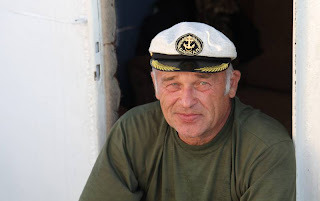Moments mémorables...
Eric: À Khank, nous avons assisté au festival Naadam, la fête nationale de la Mongolie. Avec ses commentaires et ses explications, Konstantin – un Russe qui connaît bien la région – nous a permis de mieux comprendre le mode de vie mongol.
Ulysse: Mongolie. Lorsqu'on a transformé nos canots en « ambulances » afin de traverser un homme souffrant et sa famille. Un véhicule sur l'autre rive devait l'amener d'urgence à l'hôpital. Fort en émotions!
Sarah: Nous tournons une pointe du delta de la Selenge et nous l'apercevons: Baïkal. Voilà la dernière étape de notre expédition. Ce que nous avons célébré avec un verre de vodka et un plongeon dans le plus profond lac de la planète.
Elsa: Séjour chez Nina et Jenya. Nous y avons escaladé une paroi et expérimenté le « bania », sauna russe, en plus de déguster un bol de « borsht », soupe traditionnelle du pays. De cette rencontre est née une belle amitié.
Quelques « personnages » rencontrées...
- La mère d'une famille de trois adolescents qui demeure dans une petite maison de bois d'une pièce. Elle a insisté pour que nous passions deux jours et deux nuits au sein de sa famille. Nous avons donc partagé son quotidien: manger à leur table et dormir avec eux sur le plancher. D'une hospitalité et d'une gentillesse inoubliable.
- L'équivalent russe de Popeye le marin. Cet homme d'une cinquantaine d'années est le second capitaine d'un bateau de pêche où nous avons passé la nuit. D'une force brute – adoucie par des yeux d'un bleu perçant – il a tout du pêcheur typique: casquette de marin et tatou d'une ancre sur l'un de ses biceps.
- Un couple de voyageurs rencontré à Oulan-Oude, en Sibérie. Ces deux Britanniques font le tour du monde sur une motocyclette qu'ils ont confectionnée. Voir leur site Internet: http://www.guzzioverland.co.uk/
Ce dont on se serait passé...
Elsa : 18 juillet. Je suis frappée par un coup de chaleur. La nuit est ponctuée d'étourdissements, de frissons, de nausées et de vomissements. Mon corps ne s'en est remis qu'après quatre jours.
Ulysse : La bureaucratie des douanes mongoles lors du passage des canots. Un casse-tête administratif digne d'un roman de Kafka.
Sarah : Russie. Avant que j'aie le temps de le réaliser, je suis tombée dans un puits abandonné recouvert d'herbes. Diagnostic: cheville fracturée. J'ai passé les derniers jours de l'expédition à sautiller sur une jambe.
Expérience la plus intense...
Nous sommes en train de rejoindre la côte ouest du lac Khovsgol, en Mongolie – une traversée de 17 km –, lorsqu'un orage électrique se pointe le nez. Un vent de face transforme le lac en immense piscine à vague pendant que des éclairs déchirent le ciel et frappent la colline vers laquelle nous nous dirigeons. Une heure et demi en plein orage à s'éreinter pour rejoindre la côte la plus proche.
Si c'était à refaire...
En Mongolie, nous avions une contrainte de temps à cause des visas. Comme tous bons voyageurs, nous aurions apprécié profiter davantage de ce pays. Aussi, nous aurions apprécié avoir plus de défis – portages, orages, rapides de niveaux supérieurs – afin d'apprécier encore plus les jours où nous nous la coulions douce.
Et pour la suite des choses...
Sarah: Je commencerai par faire le montage de la vidéo de l'expédition. Ensuite, je planifierai ma prochaine expédition. Tout ce que je peux dire à son sujet, c'est qu'elle se déroulera en quelque part d'extrêmement froid et enneigé où le vent nous permettra de faire du cerf-volant à traction!
 Ulysse: À court terme: bourlinguer en Russie et écrire quelques articles. À moyen et long terme: travailler et développer un projet qui a germé dans ma tête au cours de l'expédition. À suivre...
Ulysse: À court terme: bourlinguer en Russie et écrire quelques articles. À moyen et long terme: travailler et développer un projet qui a germé dans ma tête au cours de l'expédition. À suivre...Elsa: Je rédigerai un rapport d'expédition pour terminer mon baccalauréat en plein air. L'an prochain, je compte faire mon cours d'instructeur à la NOLS, une école de plein air, pour éventuellement enseigner le canot et la vie en expédition.
Par: Équipe Vada

















































